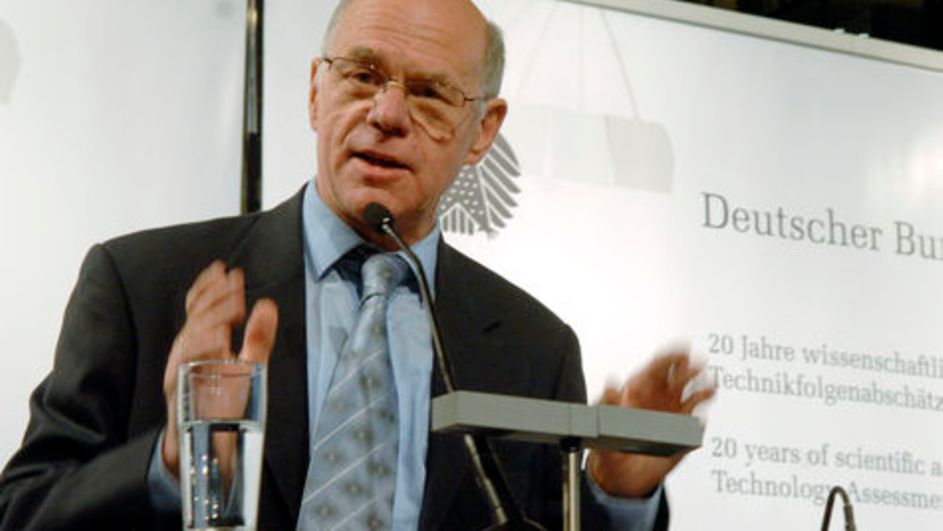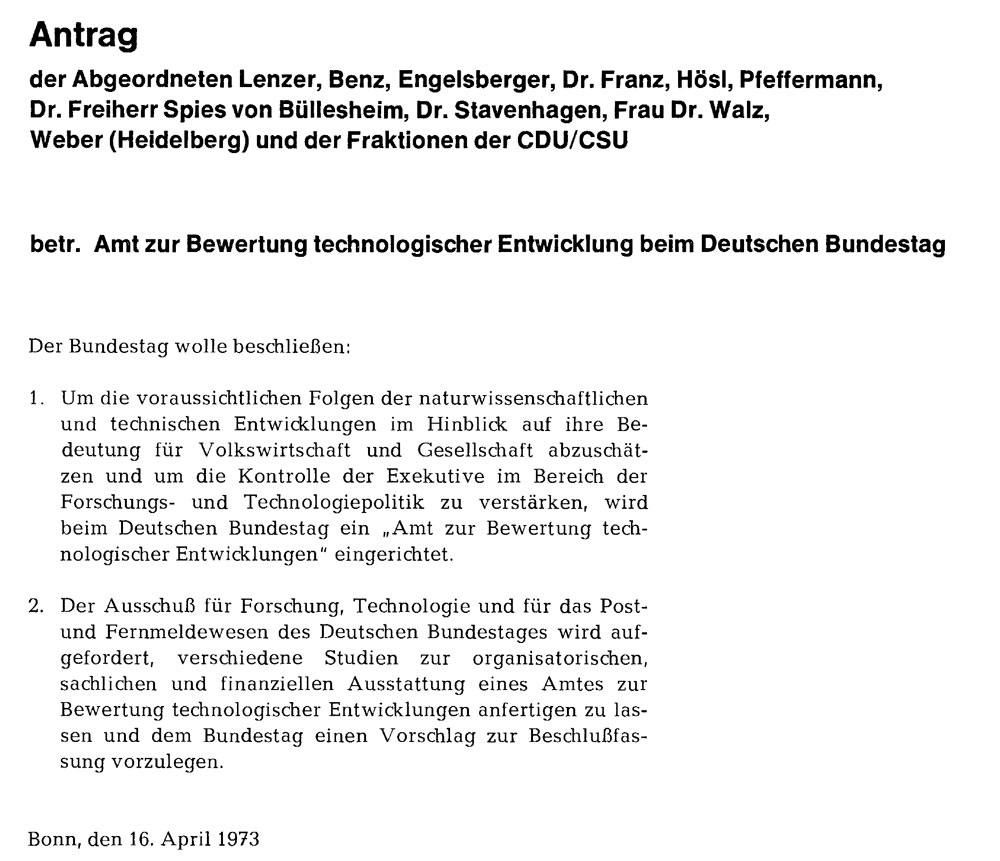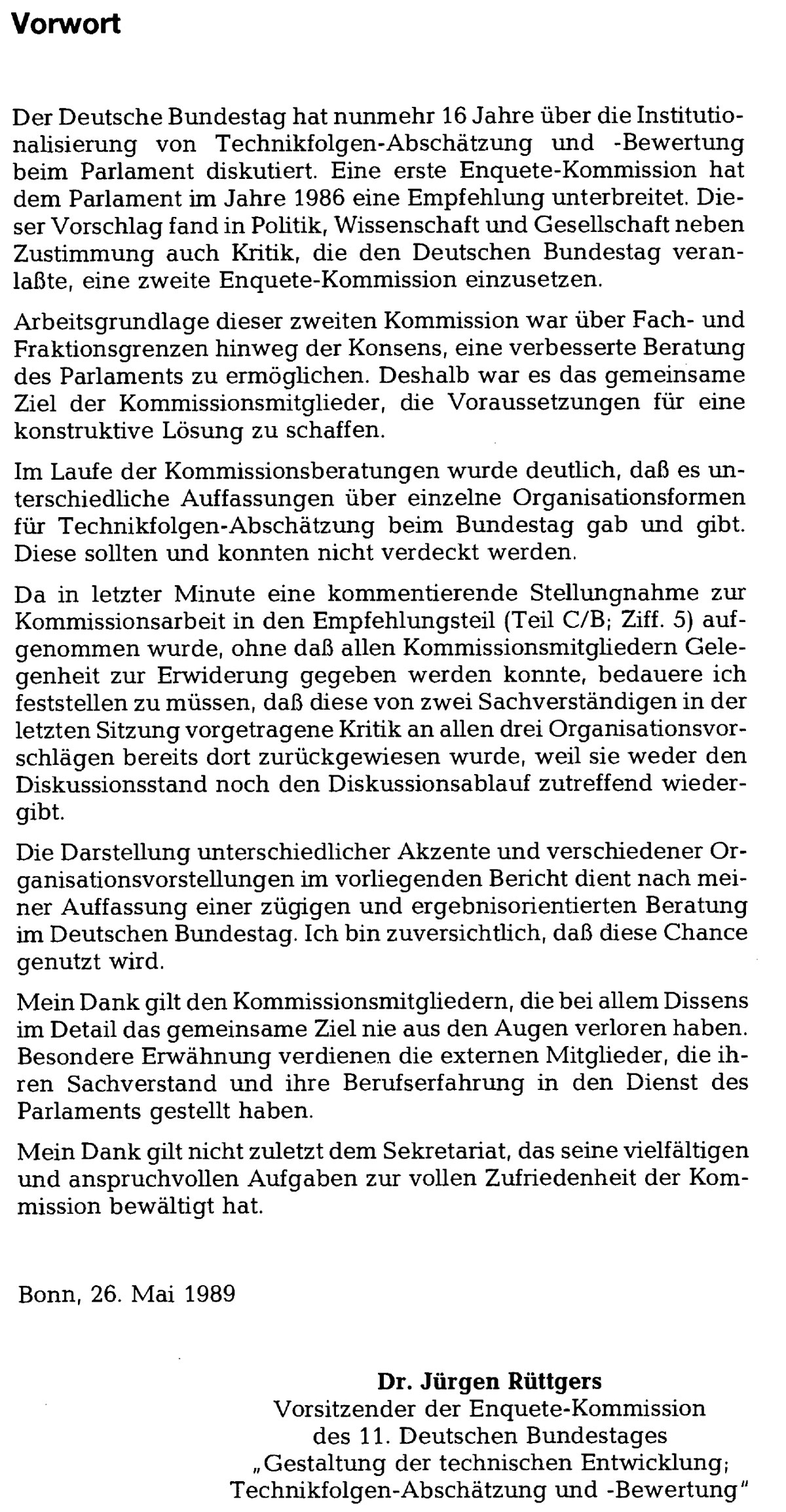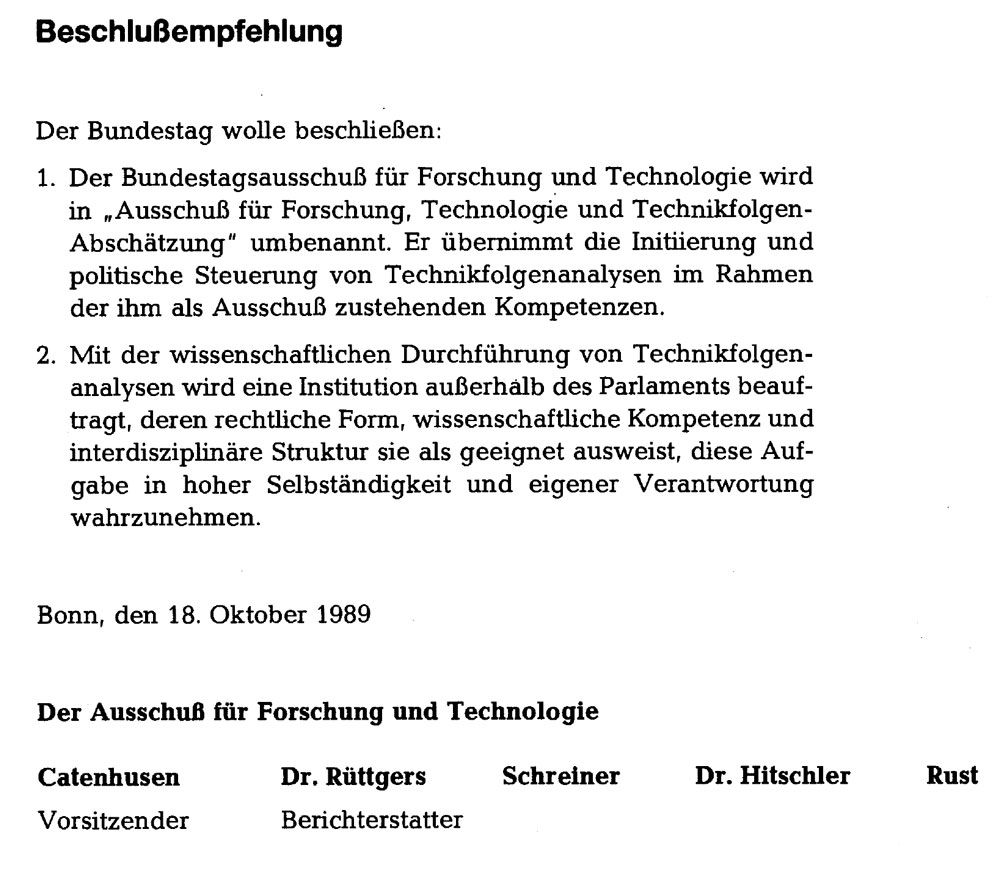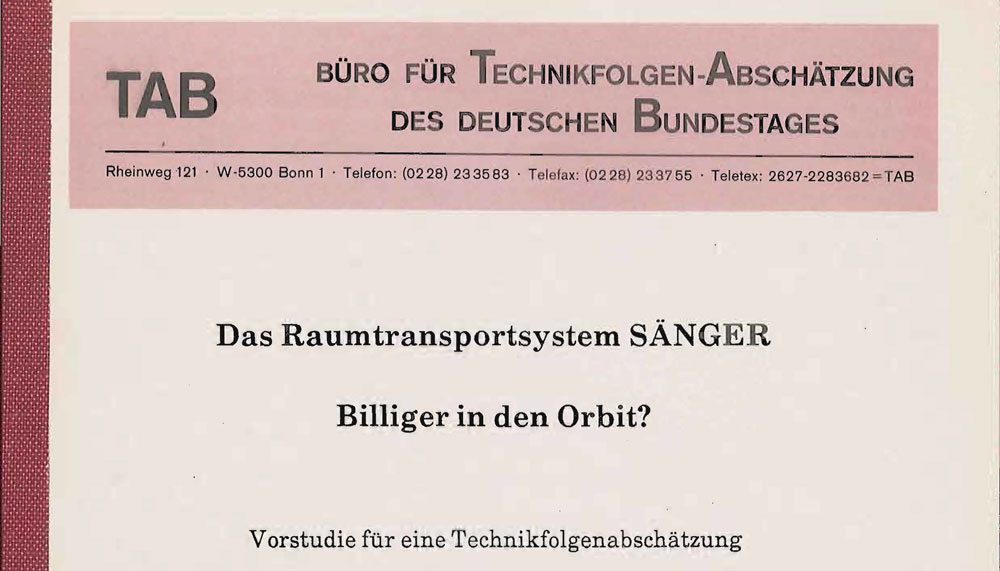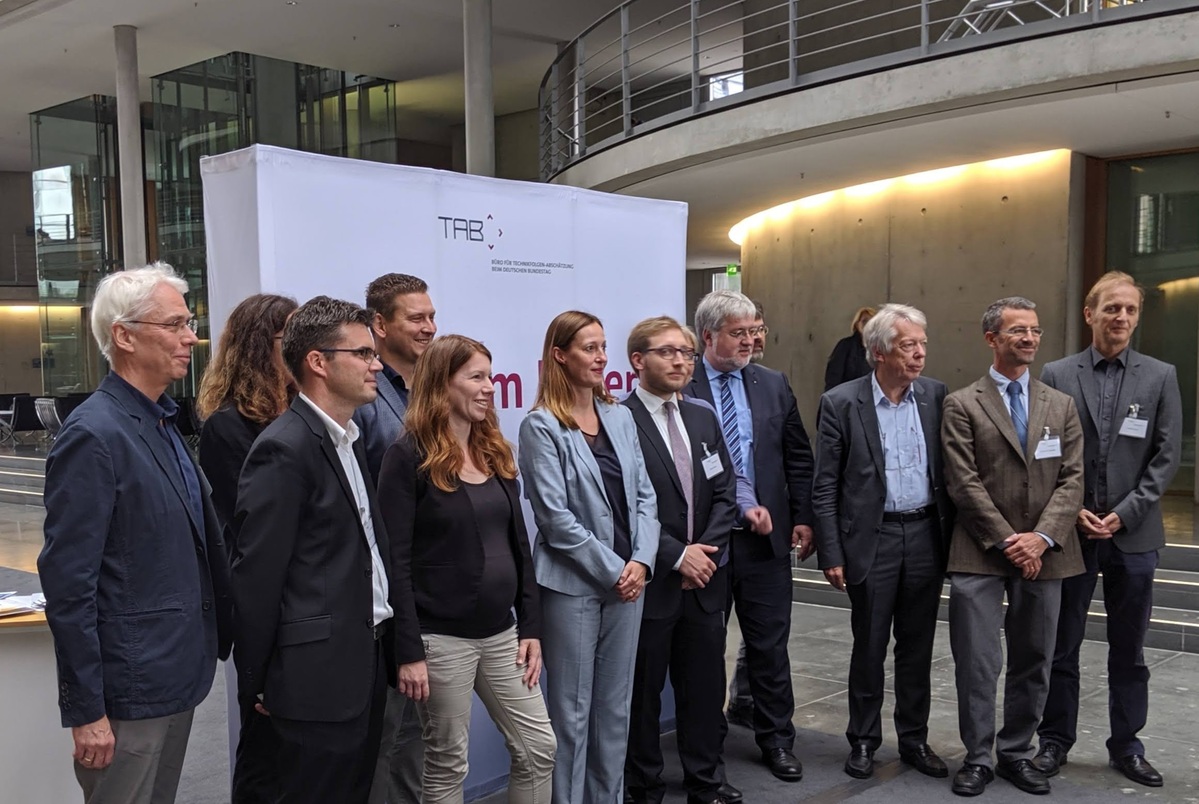History of TA in the German Bundestag
The idea of providing ongoing technology assessment support to Parliament and its committees dates back to the 1970s. That decade was a time of intense and often contentious debate about the opportunities and risks of scientific and technological developments. Earlier technological optimism had given way to widespread scepticism. In addition, many problematic social and environmental consequences raised awareness of the need for early assessment and evaluation of technology development and use. One response to this challenge was the development of the concept of technology assessment (TA). The German Bundestag also debated the opportunities, risks and potential of new technologies. The discussion soon focused on whether and how TA could be used to support opinion-forming and decision-making processes. The Office of Technology Assessment established in the US Congress in 1972 was seen as a model in many respects.
Content overview
sprungmarken_marker_2185
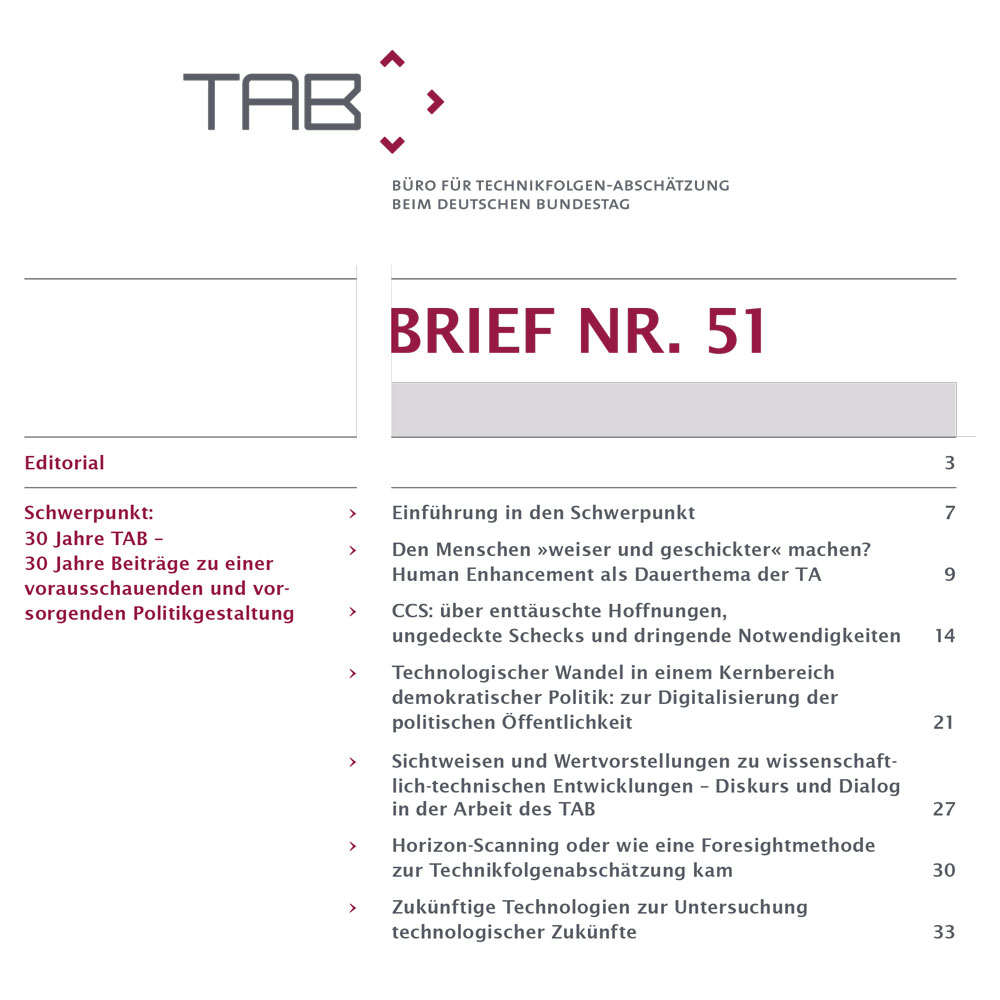
Our newsletter on 30 years TAB
Zum TAB-Brief (only in German)The »institutionalization debate«
The institutionalisation debate started in 1973 with a motion by the then opposition, the Christian Democratic Union/Christian Social Union (CDU/CSU) parliamentary group, to establish an »Office for Evaluation of Technological Development at the German Bundestag« (Bundestagsdrucksache 7/468). In the next few years, this was followed by numerous proposals from the other parliamentary groups. An important milestone was the Study Commission on »Assessment and Evaluation of Technological Impacts; Design of the Framework Conditions of Technological Development«, which was set up in the 10th electoral period by joint decision of the parliamentary groups on 14 March 1985 (Bundestagsdrucksache 10/2937). After submitting a proposal on the »Institutionalisation of an advisory body for technology assessment and evaluation at the German Bundestag« in 1986, the Commission completed its work by the end of the electoral period with an interim report containing recommendations for the organisation of TA at the German Bundestag (Bundestagsdrucksache 10/5844).
The 11th German Bundestag again set up a Study Commission on technology assessment. Its task, among others, was to adopt the criticism of the institutionalisation model and to submit a new proposal for the establishment of TA in the German Bundestag. In its final report (Bundestagsdrucksache 11/4606), the Commission of Inquiry presented three different models for discussion and decision.
The CDU/CSU and FDP parliamentary groups suggested renaiming the Committee on Research and Technology to »Committee on Research, Technology and Technology Assessment«, which would be responsible for the initiation and political control of TA. An institution outside Parliament would be commissioned to conduct TA studies and carrying out »this task with a high degree of independence and responsibility«.
The parliamentary group of the SPD proposed to establish a committee for parliamentary technology advice as well as a scientific unit (about 15 members) within the German Bundestag. The committee and the scientific unit should be supported by a Board of Trustees appointed by the German Bundestag.
The parliamentary group of the Green Party voted for the establishment of a TA foundation foundation which would be headed by members of the German Bundestag and non-parliamentary experts to be elected by the General Assembly. Furthermore, an institute would be assigned to the foundation whose task would be to accompany TA studies and prepare them for the Parliament. Additionaly, a permanent scientific unit would be attached to the Presidium of the German Bundestag which would - besides other tasks - award TA studies to the foundation.
The establishment of a parliamentary advisory capacity for TA
On 16 November 1989, the German Bundestag voted by a majority of the CDU/CSU and FDP coalition partners to rename the "Committee on Research and Technology" the "Committee on Research, Technology and Technology Assessment" and to authorise a scientific institution to carry out technology assessment for the German Bundestag (Bundestagsdrucksache 11/5489). This paved the way for the establishment of a permanent institution.
On the justification for the establishment of a permanent scientific advisory capacity for the German Bundestag:
»The dynamics of technical progress is one of the basic prerequisites for the economic and social performance of our country, for securing our natural livelihoods and for solving global human problems.
However, new technologies can also have unintended and undesirable consequences for people and nature. The German Bundestag must help to exploit the opportunities of new technologies and reduce the risks. This includes both shaping the framework conditions of technical progress and participating in the social dialogue. The political debate on science and technology should reduce irrational attitudes and strengthen orientation and trust. To fulfil its tasks in this area, the German Bundestag makes use of various instruments, such as commissions of enquiry, hearings, the Scientific Service, which have basically proved their worth. However, in view of the new dimensions of what is technically feasible and the increasing pace of technological change, Parliament's need for information has increased. Therefore, a supplement to the existing instruments by a continuously usable advisory capacity is necessary.«
Source: Decision recommendation and report of the Committee on Research and Technology, Drs. 11/5489 vom 26. Oktober 1989, S.6
Institutional development of TAB since 1990
On 29 August 1990, following an invitation to tender and at the suggestion of the then Committee on Research and Technology, a contract was signed with the Karlsruhe Nuclear Research Centre for a three-year pilot phase and the Office of Technology Assessment at the German Bundestag (TAB) was established. Since then it has been run by the Institute for Technology Assessment and Systems Analysis (ITAS) - until 1995 the Department for Applied Systems Analysis (AFAS) - of the Karlsruhe Institute of Technology (KIT), a merger of the Forschungszentrum Karlsruhe and the University of Karlsruhe.
At the end of the pilot phase, the German Bundestag decided on 4 March 1993 to establish a permanent advisory institution "Technology Assessment (TA) at the German Bundestag" (Bundestagsdrucksache 12/4193). For the following two five-year periods (until August 2003), the (then) Karlsruhe Research Centre was commissioned to operate TAB on its own; from September 2003 to August 2013, it cooperated with the Fraunhofer Institute for Systems and Innovation Research (ISI), Karlsruhe, in accordance with a decision of the Committee for Research, Technology and Technology Assessment; from September 2013 to August 2018, it cooperated with the Helmholtz Centre for Environmental Research (UFZ), the Institute for Future Studies and Technology Assessment (IZT) as well as with VDI/VDE Innovation + Technik GmbH.
On 6 June 2018, and again on 21 June 2023, the Committee for Education, Research and Technology Assessment decided, following a call for tenders and a multi-stage application process, to entrust the Karlsruhe Institute of Technology with the operation of TAB for a further five years (until 31 August 2028), whereby it will continue to cooperate with the Institute for Futures Studies and Technology Assessment (IZT) and VDI/VDE Innovation und Technik GmbH (VDI/VDE-IT) in certain areas of activity.
Documents and Links (in German)
- Drs. 7/468 - Antrag: Amt zur Bewertung technologischer Entwicklung beim Deutschen Bundestag - 16.04.1973
- Drs. 10/2937 - Beschlussempfehlung und Bericht: zu dem Antrag der Fraktionen der CDU/CSU, FDP und der Fraktion DIE GRÜNEN - Drucksache 10/2383 - Technikfolgenabschätzung und -bewertung zu dem Antrag der Abgeordneten Roth, Vosen, Lutz, Catenhusen, Fischer (Homburg), Grunenberg, Hansen (Hamburg), Dr. Kübler, Nagel, Stahl (Kempen), Stockleben, Vahlberg, Buschfort, Dreßler, Egert, Glombig, Heyenn, Kirschner, Peter (Kassel), Reimann, Schreiner, Frau Steinhauer, Urbaniak, Weinhofer, von der Wiesche, Dr. Vogel und der Fraktion der SPD - Drucksache 10/2517 - Gestaltung der technischen Entwicklung; Technikfolgenabschätzung und -bewertung - 27.02.1985
- Drs. 10/5844 - Unterrichtung: Bericht der Enquete-Kommission "Einschätzung und Bewertung von Technikfolgen; Gestaltung von Rahmenbedingungen der technischen Entwicklung" gemäß Beschluß des Deutschen Bundestages vom 14. März 1985 - Drucksachen 10/2937, 10/3022 - Zur Institutionalisierung einer Beratungskapazität für Technikfolgen-Abschätzung und -Bewertung beim Deutschen Bundestag - 14.07.1986
- Drs. 11/4606 - Bericht und Empfehlung: Zur Notwendigkeit und Ausgestaltung einer ständigen Beratungskapazität für Technikfolgen-Abschätzung und -Bewertung beim Deutschen Bundestag - 30.05.1989
- Drs. 12/4193 - Beschlussempfehlung und Bericht: zu dem Antrag der Fraktionen der CDU/CSU, SPD und F.D.P. - Drucksache 12/3499 - Beratungskapazität "Technikfolgenabschätzung" beim Deutschen Bundestag - 22.01.1993
- Drs. 17/3010 - Bericht: Technikfolgenabschätzung (TA) Technikfolgenabschätzung beim Deutschen Bundestag - Eine Bilanz - 22.09.2010
- Wissenschaftliche Beratung über Chancen und Risiken. Bildergalerie und Artikel zur Festveranstaltung anlässlich des 20-jährigen Jubiläums im Webarchiv des Deutschen Bundestages
- Parlamentarische Technikfolgenabschätzung in Europa.
Grunwald, A.; Hennen, L.; Sauter, A. im Schwerpunktheft »Technik, Folgen, Abschätzung« der Zeitschrift »Aus Politik und Zeitgeschichte« (Beilage der Wochenzeitung »Das Parlament«) vom 3. Februar 2014 . - Technikfolgenanalysen und Technikfolgenabschätzung beim Deutschen Bundestag. »Aktueller Begriff« der Wissenschaftliche Dienste des Deutschen Bundestages vom 18. Februar 2014.
- Festschrift "25 Jahre wissenschaftliche Politikberatung - Technikfolgenabschätzung beim Deutschen Bundestag"
- lookKIT 03/2019, Für eine sachliche Debatte (Zeitschriftenaufsatz über das Büro für Technikfolgen-Abschätzung beim Deutschen Bundestag)
- Wissenschaft und politische Beratung, Interview mit E. D. Rossmann, TATuP - Zeitschrift für Technikfolgenabschätzung in Theorie und Praxis, v. 29, n. 1, p. 52-55, 1 Apr. 2020.
- Pressemitteilung des Bundestages vom 21.06.2023: „Institut für Technikfolgenabschätzung und Systemanalyse (ITAS) bleibt Betreiber des Büros für Technikfolgen-Abschätzung“.
- Presseinformation des KIT vom 21.06.2023: „Technikfolgenabschätzung: KIT berät den Bundestag für weitere fünf Jahre“.
Grunwald, A.; Krings, B.; Lösch, A.; Scheer, D.
2025. Nomos Verlag
Jahnel, J.; Nentwich, M.; Riousset, P.; Milchram, C.; Kehl, C.; Albrecht, S.
2025. Karlsruher Institut für Technologie (KIT). doi:10.1553/ita-ms-25-01
Grunwald, A.
2024. Edward Elgar Publishing. doi:10.4337/9781035310685
Grünwald, R.; Peissl, W.
2021. Technikfolgenabschätzung : Handbuch für Wissenschaft und Praxis. Hrsg.: S. Böschen, 131–143, Nomos Verlagsgesellschaft. doi:10.5771/9783748901990-131
Böschen, S.; Grunwald, A.; Krings, B.-J.; Rösch, C. (Eds.)
2021. Nomos Verlagsgesellschaft. doi:10.5771/9783748901990
Lindner, R.; Decker, M.; Ehrensperger, E.; Heyen, N.; Lingner, S.; Scherz, C.; Sotoudeh, M. (Eds.)
2021. Nomos Verlagsgesellschaft. doi:10.5771/9783748901556
Kehl, C.; Albrecht, S.; Riousset, P.; Sauter, A.
2021. Sustainability, 13 (23), Art.-Nr.: 13442. doi:10.3390/su132313442
Nierling, L.; Torgersen, H. (Eds.)
2020. Nomos Verlagsgesellschaft
TAB
2020. Büro für Technikfolgen-Abschätzung beim Deutschen Bundestag (TAB)
Stegmann, B.
2019. LookIT. LookKIT. Das Magazin für Forschung, Lehre, Innovation. The magazine for research, teaching, innovation., 2019 (3), 18–20
TAB
2018. Büro für Technikfolgen-Abschätzung beim Deutschen Bundestag (TAB)
Decker, M.; Lindner, R.; Lingner, S.; Scherz, C.; Sotoudeh, M. (Eds.)
2018. Nomos Verlagsgesellschaft
Lindner, R.; Goos, K.; Güth, S.; Som, O.; Schröder, T.
2016. Büro für Technikfolgen-Abschätzung beim Deutschen Bundestag (TAB). doi:10.5445/IR/1000133371
Decker, M.; Bellucci, S.; Bröchler, S.; Nentwich, M.; Rey, L.; Sotoudeh, M.
2014. Nomos Verlagsgesellschaft. doi:10.5771/9783845271170-11
TAB
2014. Büro für Technikfolgen-Abschätzung beim Deutschen Bundestag (TAB)
Grunwald, A.; Revermann, C.; Sauter, A.
2012. Berlin : edition sigma, 2012, edition sigma
TAB
2009. Büro für Technikfolgen-Abschätzung beim Deutschen Bundestag (TAB)
TAB
2006. Büro für Technikfolgen-Abschätzung beim Deutschen Bundestag (TAB)
Petermann, T.; Grunwald, A.
2005. edition sigma
TAB
2004. Büro für Technikfolgen-Abschätzung beim Deutschen Bundestag (TAB)
Hennen, L.; Petermann, T.; Scherz, C.
2004. Büro für Technikfolgen-Abschätzung beim Deutschen Bundestag (TAB). doi:10.5445/IR/1000137544
Hennen, L.; Petermann, T.; Scherz, C.
2004. Büro für Technikfolgen-Abschätzung beim Deutschen Bundestag (TAB). doi:10.5445/IR/1000102444
Hennen, L.; Petermann, T.; Scherz, C.
2003. Büro für Technikfolgen-Abschätzung beim Deutschen Bundestag (TAB). doi:10.5445/IR/1000137625
Hennen, L.; Petermann, T.; Scherz, C.
2003. Büro für Technikfolgen-Abschätzung beim Deutschen Bundestag (TAB). doi:10.5445/IR/1000102443
TAB
2000. Büro für Technikfolgen-Abschätzung beim Deutschen Bundestag (TAB)
TAB
1999. Büro für Technikfolgen-Abschätzung beim Deutschen Bundestag (TAB)

